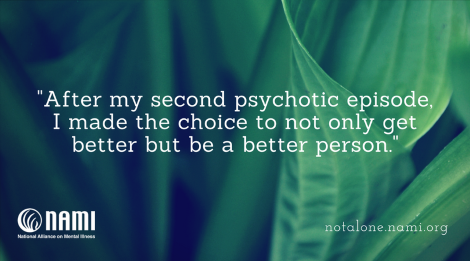May 08, 2018
By Andrew Wiese

My first episode of psychosis happened when I was 24 years old. I had just finished college and was making my way to New York to begin my new engineering job. Slowly my paranoia and fear that people were out to get me overtook me and in a panic, I drove to an airport and rushed to the nearest security officer. From there I was put in an ambulance and taken to a hospital where I received my diagnosis of schizophrenia.
Once released from the hospital, I rushed to my new career and disregarded my new diagnosis. My diagnosis was just a fluke, I told myself. Two years later, back at home in Indiana, the symptoms returned. This time worse than the first time. I was sent to an in-patient psychiatric hospital and had my schizophrenia diagnosis confirmed. It was here that I was fortunate enough to learn about first episode psychosis (FEP) clinics. Even though this was technically my second psychotic event, it was only two years since my first psychotic episode. Therefore, fortunately, I was accepted to the FEP clinic in Indianapolis named PARC (Prevention and Recovery Center for early psychosis).
In order to focus on my health and be close to family and friends, I resigned from my job in New York to stay in Indiana and get help at PARC. This was the beginning of my road to recovery. I started all the main aspects of coordinated specialty care (CSC) that a FEP clinic offers: cognitive behavioral therapy, low dose antipsychotic medication (a long acting injectable), case management, continued employment in the form of a new engineering job close to home, and family and peer support.
In addition, I participated in research at the FEP clinic to help further the understanding of the disease. I also joined my local NAMI and MHA support groups. After my second psychotic episode, I made the choice to not only get better but be a better person; these support structures were there to assist me in that goal.
During the last 15 months I have been receiving care at PARC, I believe I have gotten much better. My psychotic symptoms such as paranoia and delusions have gone away. I have grown closer to my family with the help of therapy and an excellent therapist. My existing friendships have also been strengthened, and I have made new friends through my support groups. My antipsychotic dosage has been lowered and may be reduced again in the future. In addition, my therapy appointments have been reduced from four times a month to two.
In the next few years, I would like to reduce therapy as I have discovered my own healthy coping habits to overcome any difficulties I may encounter. As with therapy, my psychiatrist appointments will also be reduced from once a month to once every two or three months. I plan to continue going to my local support groups because they are close to home and help me to feel less alone and part of a community. Eventually I plan to move into my own place and once again be completely self-sufficient.
With the help of my FEP clinic team, community, family, and friends, I have gotten back on track. With all of this support, I am refocused on achieving my professional, travel and retirement goals.
Note: This personal story was prepared by its author in his or her personal capacity. The opinions expressed are the author's own and do not reflect the views of the National Alliance on Mental Illness.
We’re always accepting submissions to the NAMI Blog! We feature the latest research, stories of recovery, ways to end stigma and strategies for living well with mental illness. Most importantly: We feature your voices.
LEARN MORENAMI HelpLine is available M-F, 10 a.m. – 10 p.m. ET. Call 800-950-6264,
text “helpline” to 62640, or chat online. In a crisis, call or text 988 (24/7).